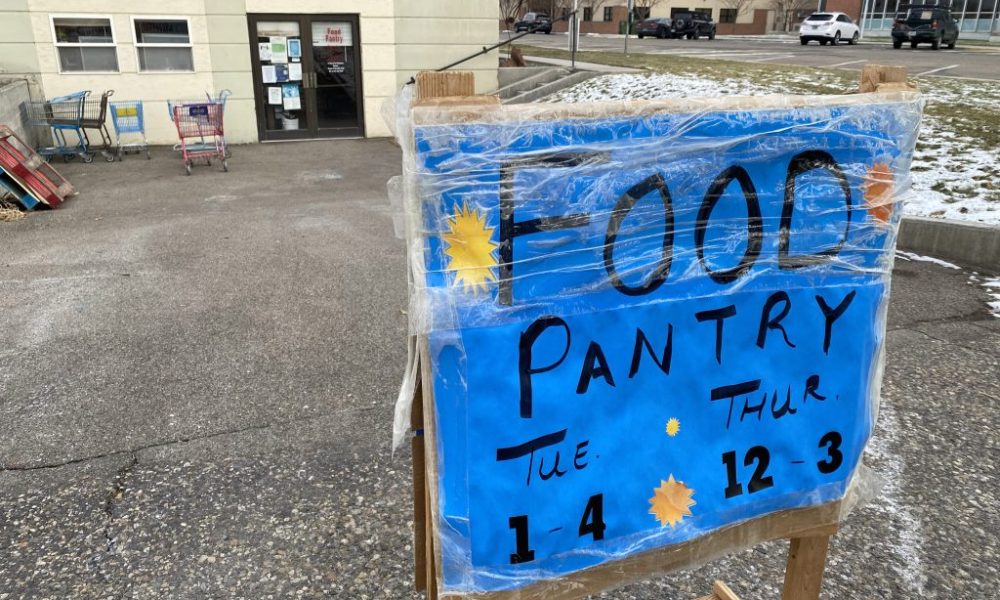The Legislature soon will send $7.5 million to the Oregon Food Bank as hundreds of thousands of Oregonians deal with plummeting federal food benefits.
The state Senate voted 22-7 on Thursday to approve House Bill 5045, a budget rebalancing measure that reconciled the state’s accounts and provided $7.5 million to the Oregon Food Bank, along with extra money for public defense, hospital staffing and repairing weather-damaged roads. Gov. Tina Kotek advocated for additional funding for the food bank and is expected to sign the measure.
It coincides with a steep cut to federal food benefits. About 720,000 Oregonians qualify for the Supplemental Nutrition Assistance Program. The federal government increased monthly SNAP benefits when the COVID pandemic hit in spring 2020, but that temporary increase ended last month.
Oregonians who receive food benefits have gone from receiving an average of $450 per household per month to $270, with food prices significantly higher than before the pandemic.
Jason Stephany, a spokesperson for the Oregon Food Bank, said via email that the network of free food markets, pantries, meal sites and delivery programs it works with have seen a sharp rise in demand for food during the past few weeks.
“We’re only a few weeks into this federal cut to families’ grocery budgets, yet we’re already seeing new records set for Oregonians served in a single day at area food assistance sites,” he said.
The organization’s CEO, Susannah Morgan, previously told the Capital Chronicle the additional money would be enough to buy food through the end of June. By that time, the food bank anticipates more federal aid will flow in, as the U.S. Department of Agriculture received approval last fall to buy $2 billion worth of domestically produced food for food banks and school meal programs.
Separately, the state Department of Human Services announced this week that it will send $170 million in extra food aid to low-income families with young children.
Republican opposition
The food bank’s funding was met with skepticism from many Republicans in the Senate and the House, where it passed 38-19 on March 20 with only Republicans opposed. Rep. Shelly Boshart Davis, R-Albany, said during the House debate that the Oregon Food Bank should not have publicly opposed the 2020 Republican walkout over climate change legislation, or publicly supported a 2022 law requiring overtime pay for agricultural workers or a pending measure to guarantee access to abortions and other reproductive care.
“If their focus was simply feeding Oregonians, I would not have a problem with the $7.5 million allocation to this organization,” Boshart Davis said. “But after the past years of watching this organization engage in very partisan activities, I do not have faith in providing millions of state dollars to a politically active organization.”
Sen. Daniel Bonham, R-The Dalles, read a nearly identical speech on Thursday, adding that he’ll draft a bill calling for an audit of the Oregon Food Bank to ensure none of the state funding it has received will be used for political activity.
Sen. Elizabeth Steiner, D-Portland and the Senate co-chair of the budget-writing Joint Ways and Means Committee, retorted that the budget measure explicitly prohibits the Oregon Food Bank from spending money on anything other than buying food.
“The money for the food bank is statutorily dedicated for food,” she said. “It cannot be used for anything else. The bill says explicitly it is for food purchases only.”
Stephany said the food bank tracks every dollar it spends, and that providing food alone isn’t enough to address the root causes of hunger and poverty.
“We need policies and investments that improve access to health care and housing statewide, especially in under-resourced small towns and rural and remote areas,” he said. “Since our founding, Oregon Food Bank has supported important legislation to ensure everyone in Oregon has access to the resources we need to thrive — regardless of race, gender, religion or immigration status.”
The measure includes $70 million for the Department of Transportation’s maintenance budget to pay for higher-than-anticipated repairs to weather-damaged state highways, though the department estimates most if not all of that money will be reimbursed by the Federal Highway Administration.
It also has $25 million for the Oregon Health Authority to help address staff shortages at hospitals across the state. Throughout the pandemic, the health authority has paid for nursing contracts and other temporary medical staff.
The measure further included $1.1 million for public defenders to represent clients convicted by non-unanimous juries. A December Oregon Supreme Court decision that made retroactive a U.S. Supreme Court ruling requiring unanimous jury decisions in serious criminal cases resulted in at least 225 people challenging their convictions. There could be up to 2,000 potential cases, according to legislative researchers.
Lawmakers are expected to spend millions more on public defense during the next two-year budget, as a shortage of public defenders has left hundreds of people unconstitutionally deprived of their right to an attorney.
Oregon Capital Chronicle is part of States Newsroom, a network of news bureaus supported by grants and a coalition of donors as a 501c(3) public charity. Oregon Capital Chronicle maintains editorial independence. Contact [email protected]. Follow Oregon Capital Chronicle on Facebook and Twitter.

Julia Shumway is deputy editor of Oregon Capital Chronicle and has reported on government and politics in Iowa and Nebraska, spent time at the Bend Bulletin and most recently was a legislative reporter for the Arizona Capitol Times in Phoenix. An award-winning journalist, Julia most recently reported on the tangled efforts to audit the presidential results in Arizona.









